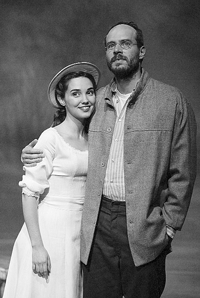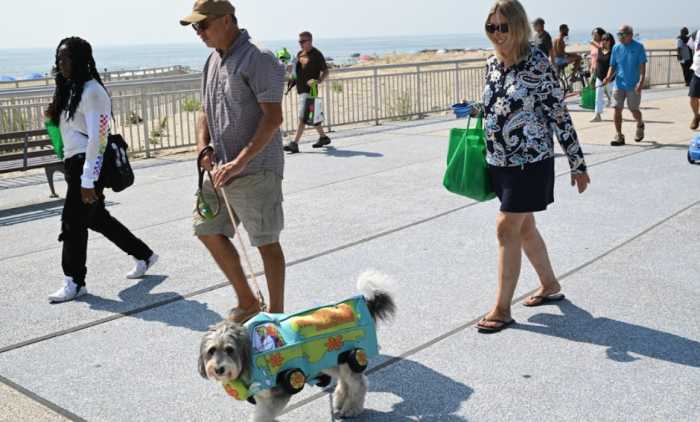By JERRY TALLMER
20 years later, Atlantic Theater Company restages “The Cherry Orchard”
Tom Donaghy, we won’t tell on you.
Except in print.
“My little signature,” says the “Cherry Orchard” adaptor who certainly doesn’t look his 41 years. “Pure and simple vanity. The auction where Lopakhin buys the orchard takes place on August 22. I changed it to August 21.”
Tom Donaghy was born August 21, 1963 – three months and one day, as it happens, before the assassination of John F. Kennedy. He says his mother always says she dropped baby Tom out of her arms when she heard the news flash. “A very dramatic family, Italian and Irish.”
She’s Ann Geraci Donaghy, Tom’s father was Tom Donaghy, Sr, “In roofing. Don’t say a roofer. They don’t like that. He died seven years ago.”
Their son’s adaptation of “The Cherry Orchard” is now on stage at the Atlantic Theater under the direction of Scott Zigler, with a cast that includes Brooke Adams, Larry Bryggman, Isiah Whitlock, Jr., and – as the ancient fusspot manservant Firs, wonderful Alvin Epstein, the original Lucky of the first New York City production of Samuel Beckett’s “Waiting for Godot.”
The “Cherry Orchard” – the last and to Donaghy the greatest of Chekhov’s four masterpieces, though the playgoer you’re reading would vote for “The Seagull” – is essentially a drama about stasis, everybody kvetching over the looming loss of Lyubov Ranevskaya and her brother Leonid’s big beautiful old estate, and nobody except Lopakhin, the thriving entrepreneurial son of a serf on that estate, doing anything about it.
He wants to save it for them – essentially for her, the romantic, histrionic Ranevskaya — by ripping up the cherry orchard and building thereon a crop of high-income summer-rental dachas. When nobody moves off the dime, it is Lopakhin who at the last minute puts in a huge bid at auction for the estate, cherry orchard and all. And gets it.
Chekhov would never have used a word like “kvetching,” nor, I think, other Yiddishisms (“Schlepihodov,” “Just go already”) that pop here and there into Donaghy’s swift, lively Englishing/Americanizing of the Russian original, but they sort well with such other appropriations from contemporary lingo as the ironic “Excuse me?” or “Thank you very much,” and – yes! – “What a pain in the ass you are.”
Says Tom Donaghy, who earlier in life “went to several Catholic schools until I got out,” and came to New York to enter NYU at age 18: “I love Yiddish.” He thought of “Schlepihodov” as an unflattering nickname for a nerd named Yepikhodov, a nervous accountant who is always stumbling into furniture, knocking over things. “In the original they call him ’Twenty-two misunderstandings’ or ‘Double-trouble.’ I went from there.”
Donaghy’s a well-established playwright in his own right. Ten years ago his “Northeast Local” broke in, in New York, at the Mitzi Newhouse, with Eileen Heckart at its center as the mother.
“It was sort of set where I grew up, in Philadelphia, between 1963 and 1993,” he says. “Those particular times and how they bore on that family. Working-class people. How they adapt to the times.”
Sounds a bit like Odets.
“I was influenced by Odets,” Donaghy acknowledges. And by Chekhov. Been reading Chekhov all his post-crib life. Never tried adapting and/or translating him (or anyone else) before. That came as a commission from the Atlantic Theater Company, of which Donaghy had been a founding member as a student of David Mamet’s and William H. Macy’s back at NYU 20 years earlier.
NYU classmate Scott Zigler was another such member. It was Zigler’s desire to do “The Cherry Orchard” in the Atlantic’s 20th year because that play, in a prior translation, had been the first ever put on by the Atlantic at the 20th Street location.
“The truth of the matter,” says truth-teller Donaghy, “is that I got wind of Scott’s planning to do this, and suggested myself.” Pause. “I actually approached [Atlantic artistic director] Neil Pepe first. Both very generously accepted my offer,” he wryly adds.
Donaghy speaks and reads no Russian. “As luck would have it, Atlantic literary manager Christian Parker [official title: Director of New Play Development] does know Russian,” and Parker steered Donaghy to Richard Myers, director of the M.A. program in Russian literary history at Columbia University.
The Atlantic commissioned Myers to create a literal translation of “The Cherry Orchard” working from the first published Russian edition in 1905.
“I didn’t want to look at any other translation first. I took that and sat with him several times, going over it, as he explained the various different ways [the words] could have gone, I had many, many questions, beginning with: ‘Why is this so short, only 70 pages, when other Chekhov plays are twice that length?’ ”
Donaghy carried that same question to Moscow, where – “in his office above the jewel-box original Moscow Art Theater, only 300 seats all told” – he met with Moscow Art Theater artistic director Anatole Smeliansky.
“He answered my question by saying that on the page, in Russian, it’s shorter. So I asked: ‘How do you explain the three-hour ‘Cherry Orchards’ we have had to endure?’ And he said: ‘In Russia we can speak for 20 minutes without using a verb. It’s an impressionistic language. Also the tradition is to draw this play out as tragedy.’ ”
Which was at the root of the whole private war between Chekhov and Stanislavsky. Director Stanislavsky saw the stuff as tragedy. Playwright Chekhov insisted it was comedy.
Donaghy: “I wanted to look at one of the grand estates, which are outside St. Petersburg, so I went there. I also looked at photos, at archives, and went to Chekhov’s own house, which is now a museum in Moscow.”
Naturally, he loves this play – “always have” – and considers it “the most modern” of Chekhov’s Final Four. “I see in it the beginnings of 20th-century drama; the beginnings of Beckett. People waiting for something to happen. It was written in 1904, right before the first Russian Revolution. Things were in the air. A very prescient play. A lot of people were losing estates. There was no one to work them.”
Alvin Epstein, says playwright Donaghy, “makes the Beckett connection just by being in the play. He’s done Firs in other productions before. Old Firs mutters a lot, and Alvin does a lot of ad libs. There are sections where he’s allowed to improvise. It varies from night to night.”
Donaghy has domiciles in the West Village and in the Catskills – “where, of course, 30 people show up every weekend.”
What’s next?
“Retirement – if I’m lucky.”
Mr. Lopakhin, don’t let this guy’s cherry orchard go to seed.
WWW Downtown Express


























